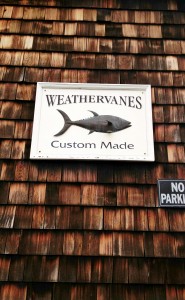From my breakfast perch, I can see a beautiful heritage house across the street. The lovely owner runs a home-based daycare.
This morning I watched parents in various makes of cars hurl themselves to the curb, gently and with apparent attention shepherd their children inside, …then run back nearly headless to the cars that would take them to their minutely scheduled lives:
To catch the train to work in Boston?
To take the highway to work in suburban office parks?
To go to a local job?
Where were they all off to, in such a great hurry?
Of course I remembered that I used to do this myself, before I (sort of kind of involuntarily) opted out of that rat race.
:::::::
Last month I had one of those very blue periods where what should be a broad horizon shrinks down to a tiny speck that feels like a dark, dark hole in the ground.
I’m happy to report that my brain managed to adjust itself and I don’t feel entirely rotten at present. But these things do come and go, as many of you know. One of my sisters calls it having “das arme Tier” (except she’ll say it not in high German, but in an exaggerated Rhineland dialect, “dat aahme Dier”): that poor dear.
You can have that damn poor dear, you see. And when you do, she’s going to make sure you feel that it’s like that. Exactly like that.
(Note for monolinguists: Tier means animal, here meant as creature. Dier is dialect: in the Rhineland, hard sounds tend to soften: t becomes d, ich becomes ish. In Berlin, on the other hand, pronunciation is harder: ich becomes the famous – infamous? – ick.)
I think it’s ironic that, just as “the poor dear” sticks with me (and to me, sometimes), I also have a special memory of another concept: the Lebenskünstler or life artist. He or she is a person who escapes constricting social norms and manages to live life on her own terms.
In a super-ramped up consumerist world, we may be forgiven if we conflate Lebenskunst (the art of living) with lifestyle and therefore as something we ought to be able to buy.
Money sure is useful (and a validation of oneself, if one is paid for what one does), but Lebenskunst is not just a lifestyle thing.
It’s mostly an attitude, a perspective, and a question of creativity.
In one sense, it’s about being able to count one’s blessings – although, again using my memories as an example, counting blessings or having an attitude of gratitude is something my tribe made fun of, often. Really often. Gratitude, schmatitude. Gratitude was for weaklings, and for optimistic fools who ended up being happy to tend their own gardens – instead of going out there and Doing Something Important. So we made fun. I’m not sure we really understood the corrosive effect on ourselves of our sarcasm. But I think we did it because we assumed that some things were basic social and human rights, and that it was ridiculous to be grateful for anything-and-everything. (People have argued about this for centuries.) I suspect, too, that sarcasm and gallows humor was also a shield – and perhaps a lance – against the poor dear. Today I’m more inclined to conclude that tending one’s own garden isn’t the worst of all possible worlds – provided you have your little plot, that is.
The Lebenskünstler is creative about gratitude, and uses it to build. She’s no hapless naif, or poor dear. He has a sense of style – and therefore a lifestyle – but isn’t a slave to consumption. She builds (creates) with what she’s given, and sometimes that’s the short end of the stick. No matter. It’s a matter of philosophy, and consolation. Most of all, Lebenskunst is about creativity and using what you’ve got.
 Give her half a chance, and my poor dear tells me I’ve got nothing. I have to tell her to shut her uncreative trap. My poor dear makes fun of the Lebenskünstler swanning about, the one who’s busy making plans and creating (largely imaginary) worlds.
Give her half a chance, and my poor dear tells me I’ve got nothing. I have to tell her to shut her uncreative trap. My poor dear makes fun of the Lebenskünstler swanning about, the one who’s busy making plans and creating (largely imaginary) worlds.
The poor dear doesn’t want anyone actually to create anything. At this point I have to show my poor dear the door, although she’s feisty and incredibly difficult to shove away. But push I must, because my poor dear does nothing to help me get anywhere, or even help me get started.
She is the worst rat race in the whole universe because she makes me compete against her, which is no contest at all because she’ll triumph.
The Lebenskünstler must learn to subtract. Ask any sculptor and she’ll tell you that subtraction is as valuable a creative technique as addition. It’s time once again to give the poor dear a Lebenskunst make-over.


{ 3 comments… read them below or add one }
Seems to me I come from the same tribe, when it comes to the shield of sarcasm and the blindness to “creativity and using what you’ve got.” Candide was our hapless hero too, with the plot of dirt to tend to as the pot of gold at the end of all illusionary rainbows.
Subtraction, or editing in other forms, is indeed the great “value” addition, as you point out.
And the trick, for us from that particular tribe, is to have that poor dear and the Lebenskünstler get together for happy hour to seal the terms of the collaboration. 🙂
Great idea, Maria – I like the idea of the Lebenskünstler and the poor dear getting together for peace talks. It would be high time. It might be a high time! 😉
.
You know, there’s that psychological strategy where you’re supposed to let the poor dear (or whatever negative, destructive inner voice is dragging you to hell) natter on for a while, after which you address it directly (pretend you’re talking to it, that it’s sitting or standing across from you), and say, “Thank you for your input. That was interesting. But you’re not needed anymore, so you can go now.” I’ve never tried it, but some people say it works.
.
I’m amazed to discover that after all these decades, I’m still grappling with basic issues shaped in early childhood. For nearly the whole time that I knew my mother, she was clinically depressed. I have almost no recollections of real conversations with her – she was silent much of the time, uncommunicative, and when she spoke, she said things that negated hope (for example, one of her favorite bits of advice to me: “Don’t try too hard/ set your sights too high, you’ll only be disappointed”). Obviously depressed, although at the time I didn’t know that. Naturally, too, I thought her state of mind was my fault – and of course I was “right” insofar as I was unwanted (which she never shied away from telling me: I was a mistake). My conclusion at the time was that I caused her depression. Now, the really difficult insight (for me) to deal with is this: after years of thinking, “I don’t give a damn,” I realize I actually love my mother a great deal for I am constantly wishing myself away because I “know,” at heart (in that place that’s so painful and vulnerable), it would have made her happy had I never been born. Brrr. Not a comfortable spot to be.
.
I’m well into the age she was in during my youth, but since she’s dead I can’t have a conversation with her about how to get through this.
.
I guess I need to thank my lucky stars (a veritable firmament) that my kids know they were wanted, so that if I turn into my mother (almost every daughter’s secret nightmare), they’ll know it’s not “their” fault.
.
At the same time, I think there’s a basic brain chemistry issue at stake here. I could have been the apple of both my parents’ eyes, and my mother might still have been depressed.
.
Anyway, on a much more interesting note: Justine Musk posted a fascinating article just now on, via Twitter:
How to Be Fearlessly Creative. I like this strategy of chunking the big fear-producing thing into smaller chunks, and also of course the idea that the opposite of fear is hope, and then the power of creation.
Hi Yule, We have had a few communications in the past (about Metrocascade and the Johnson Street Bridge org) so I am taking the liberty of writing to you about my current desperation. I’ve had a novel published recently by Oolichan Books and I can’t get it read or reviewed by traditional media so I am trying to create some buzz in the blogosphere. I’d like to send you a complimentary copy of the book. No pressure to review it or plug it – just read some of it. I would appreciate it. Send me a mailing address – you have my e-mail. Thanks, BM